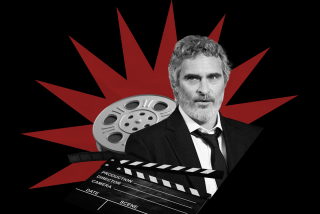Review: A survivor sifts through the ashes in haunting ‘Phoenix’
“Phoenix” is an intoxicating witches’ brew, equal parts melodrama and moral parable, that audaciously mixes diverse elements to compelling, disturbing effect.
The latest collaboration between German writer-director Christian Petzold and star Nina Hoss (their last film together, “Barbara,” was a knockout) is set in Berlin in 1945, in the immediate aftermath of World War II. But its penetrating examination of how individuals endure the unthinkable makes it relevant and contemporary.
From its opening nighttime scene at a desolate U.S. Army checkpoint to its evocative Stefan Will jazz score and the soundtrack prominence of Kurt Weill’s haunting “Speak Low,” “Phoenix’s” reliance on bleak film noir elements is immediately recognizable.
SIGN UP for the free Indie Focus movies newsletter >>
Equally unmistakable is the influence of other flamboyantly plotted films, most noticeably Alfred Hitchcock’s “Vertigo” but also classic noirs like “Laura” or outré items like George Franju’s spooky “Eyes Without a Face.”
But because of the time and place of its setting and its Holocaust survivor theme, “Phoenix” has a great deal more on its mind than the genre moments it expertly delivers.
Inspired by the French novel “Le Retour des Cendres” by Hubert Monteilhet, “Phoenix” is able to deal with questions of obsession, forgiveness, ambiguity and identity as well as core issues like the horrors we are capable of and what makes us who we are.
In all of this, “Phoenix” is helped a great deal by the delicate, nuanced performance by Hoss, very much the German actress of her generation, who was seen alongside the late Philip Seymour Hoffman in last year’s crackling “A Most Wanted Man.”
Hoss’ Nelly Lenz is first met at that U.S. Army checkpoint, in a car driven by lifelong friend Lene Winter (Nina Kunsendorf), but her face is so covered with white gauze bandages that we never get a clear look at it.
Which is just as well because Nelly, who was a nightclub singer before the war, is a disfigured Jewish survivor of the concentration camps who had been shot in the face and left for dead.
Lene, who escaped Germany while she could, has returned to care for her friend and tells Nelly that because all her family has perished she has inherited a sizable sum of money.
Lene takes Nelly to a plastic surgeon for facial reconstruction. The survivor says she wants to look exactly like her old self, but the surgeon, who advises her that “a new face is an advantage, it won’t be identifiable,” also tells her that even an attempt at a replica often does not look like the original. Which, to Nelly’s initial despair, is what happens.
An attorney who works for the Jewish Agency for Palestine, Lene has plans to move herself and Nelly to Haifa, where they can both “help found a state where Jews can be free.” But the assimilated Nelly, who never considered herself Jewish (though the Nazis begged to differ), has another plan. His name is Johnny.
A jazz pianist, Johnny was Nelly’s husband before the war, and the memory of him is one of the things that kept her alive in the camps. Even though Lene, suspicious of Johnny’s actions, cautions her against any connection with him, Nelly cannot be dissuaded. As Petzold says in a director’s statement, “I’m interested in people who don’t accept something and, in doing so, are defiant and stubborn.”
Hollow-eyed and distraught, with her face still badly bruised from the surgery and feeling “I no longer exist,” Nelly wanders through Berlin like a haunted zombie, desperate to both track down Johnny and recover her identity as an individual.
As Petzold shrewdly explains, Hoss’ exceptional work conveying this post-camp state of mind comes despite the fact that “as an actor, she can only imagine the torture; she hasn’t been through it. But what she can do is act out this impossibility: the impossibility of conveying something, behind which the character’s experiences lie.”
It doesn’t take long for Nelly to encounter Johnny (Ronald Zehrfeld, Hoss’ excellent “Barbara” costar), working as a harried busboy in a club in the American sector called Phoenix. Because of the surgery he does not recognize her, yet something is undeniably familiar about her, which gives him an idea.
Nelly also has an idea. Obsessively desperate to be close to Johnny, and prodded by Lene to be curious about his role in her arrest, Nelly goes along with Johnny’s scheme to further both aims, with unnerving results. As both characters try to find their footing and in a sense attempt to forget the Holocaust even happened, “Phoenix” uses its excellent cast and psychological acuity to get under our skin and chill us to the bone.
------------
‘Phoenix’
MPAA rating: None.
Running time: 1 hour, 38 minutes
Playing: Laemmle’s Royal, West Los Angeles
More to Read
Only good movies
Get the Indie Focus newsletter, Mark Olsen's weekly guide to the world of cinema.
You may occasionally receive promotional content from the Los Angeles Times.











